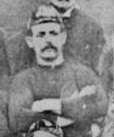George Williams (rugby union)
 | |||||||||||||||||||||||||||||||||||||||||||||
| Date of birth | 1856 | ||||||||||||||||||||||||||||||||||||||||||||
|---|---|---|---|---|---|---|---|---|---|---|---|---|---|---|---|---|---|---|---|---|---|---|---|---|---|---|---|---|---|---|---|---|---|---|---|---|---|---|---|---|---|---|---|---|---|
| Place of birth | Auckland, New Zealand | ||||||||||||||||||||||||||||||||||||||||||||
| Date of death | 27 April 1925 | ||||||||||||||||||||||||||||||||||||||||||||
| Place of death | Wellington, New Zealand | ||||||||||||||||||||||||||||||||||||||||||||
| Occupation(s) | Police officer | ||||||||||||||||||||||||||||||||||||||||||||
| Rugby union career | |||||||||||||||||||||||||||||||||||||||||||||
| |||||||||||||||||||||||||||||||||||||||||||||
George Albert Williams (1856 – 27 April 1925), also known as Bully Williams, was a New Zealand rugby union player who toured with the 1888–89 New Zealand Native football team to the British Isles and Australia.[3] Williams was one of five non-Māori players in the Natives' side.[4]
Williams was born in Auckland in 1856, and did not start playing rugby until the age of 24.[2] He was a member of the Wellington club Poneke, and was selected for Wellington province from the club in 1886, 1887 and 1888.[1]
In early 1888, Joe Warbrick, a member of the 1884 New Zealand team that toured Australia,[5] started planning for a squad of Māori rugby players to tour the British Isles.[6] As Warbrick was scouting for players throughout 1888, his plans changed, and he decided to include a number of Pākehā (European non-Māori) in the side.[4] Eventually five Pākehā were included in the squad of twenty-six, and the side was consequently named the New Zealand Native football team.[7][a]
At 32, Williams was the oldest player in the team,[7] and only joined a day before their first match.[8] The tour became the longest in rugby history; 107 matches were played during the 14-month tour, which had legs in Australia, the British Isles, and New Zealand.[9] Of these 107 matches, 74 were in the British Isles,[10] and an average of a game every 2.3 days on that leg.[11] Williams played in 53 of these,[12] scoring 12 tries in the process,[13] and captained the team on a number of occasions.[7] In total, Williams played at least 75 matches on tour (a number of team lists are missing).[12]
Williams played in all three of the Natives' "international" matches while on tour; a victory over Ireland,[14] a narrow loss to Wales,[15] and a controversial loss to England.[16][b]
Williams retired as a player after the tour, but continued to be involved in the game as a referee. Along with two other players, he contributed to tour manager Thomas Eyton's Rugby Football Past and Present, published in 1896,[17] that gave an account of the tour.[18] He contributed a number of article to the New Zealand Truth before the departure of the 1924 All Blacks.[19] Outside of rugby, Williams was a police officer, and was involved in the arrest of the Maori spiritual leader Te Whiti o Rongomai.[2] He served throughout New Zealand, including in Wellington, Hastings, Invercargill and Marlborough.[2][3]
Williams' native team cap, donated by his grandson Rob Williams, is held in the collection of the New Zealand Rugby Museum.[20]
Notes
[edit]- ^ Two of the non-Māori in the squad were not actually New Zealand-born: Patrick Keogh (England), and Edward McCausland (Australia).[7]
- ^ For details on the controversial loss to England see 1888–89 New Zealand Native football team § England international.
References
[edit]- ^ a b c Swan 1952, p. 157.
- ^ a b c d e Ryan 1993, p. 139.
- ^ a b Obituary: Mr G. A. Williams.
- ^ a b Mulholland 2009, p. 7.
- ^ Mulholland 2009, p. 4.
- ^ Ryan 1993, p. 14.
- ^ a b c d Ryan 1993, pp. 28–29.
- ^ Ryan 1993, pp. 39.
- ^ Mulholland 2009, p. 6.
- ^ Ryan 1993, p. 67.
- ^ Ryan 1993, p. 121.
- ^ a b Ryan 1993, p. 145.
- ^ Ryan 1993, p. 146.
- ^ The Auckland Star.
- ^ Swansea.
- ^ Blackheath.
- ^ WorldCat.
- ^ Ryan 1993, p. 149.
- ^ New Zealand Truth.
- ^ "1888 Native Team Representative Cap". NZMuseums. Retrieved 13 February 2023.
Sources
[edit]- Mulholland, Malcolm (2009). Beneath the Māori Moon—An Illustrated History of Māori Rugby. Wellington, New Zealand: Huia Publishers. ISBN 978-1-86969-305-3.
- Ryan, Greg (1993). Forerunners of the All Blacks. Christchurch, New Zealand: Canterbury University Press. ISBN 0-908812-30-2.
- Swan, Arthur C.; Jackson, Gordon F. W. (1952). Wellington's Rugby History 1870 – 1950. Wellington, New Zealand: A. H. & A. W. Reed.
- "Obituary: Mr G. A. Williams". Evening Post. Wellington. 29 April 1925. Retrieved 30 July 2015.
- "The New Zealand Football Team—Details of Matches and Tour". The Auckland Star. Auckland. 23 January 1889. p. 5. Retrieved 17 April 2013.
- "New Zealand Natives tour – Blackheath, 16 February 1889: England (2) 7 – 0 (0) New Zealand Natives". espnscrum.com. Retrieved 13 April 2013.
- "New Zealand Natives tour – Swansea, 22 December 1888: Wales 1G – 0G New Zealand Natives". espnscrum.com. Retrieved 13 April 2013.
- "Footballer Passes". New Zealand Truth. 2 May 1925. p. 8. Retrieved 30 July 2015.
- Rugby football (past and present) and the tour of the Native Team in Great Britain, Australia & New Zealand, in 1888–89. WorldCat. OCLC 156235844. Retrieved 30 July 2015.
